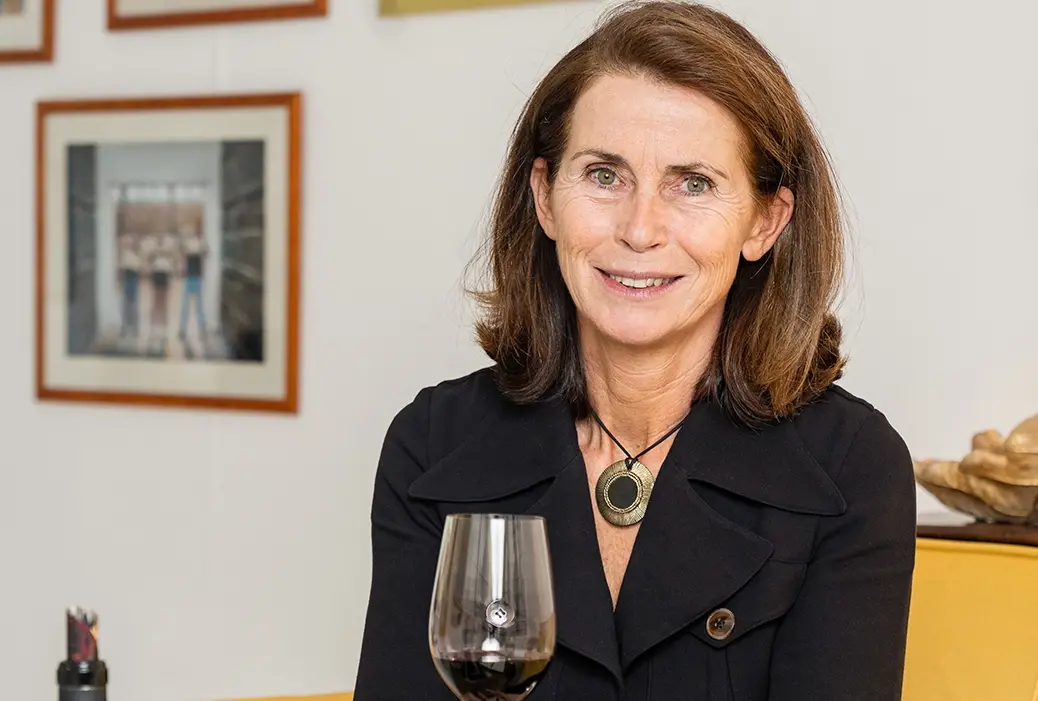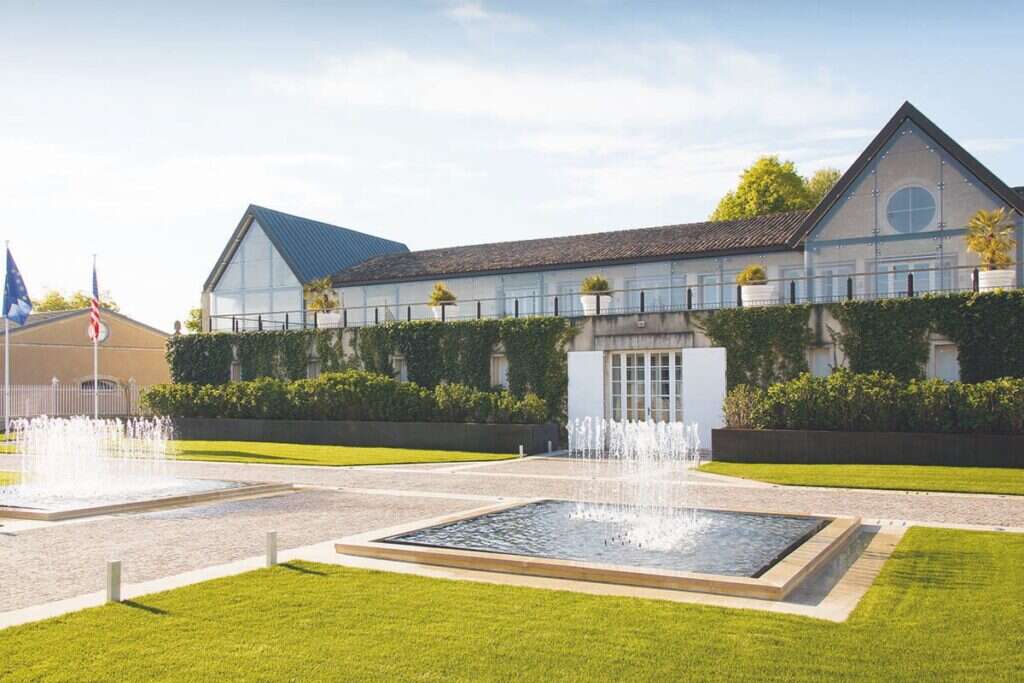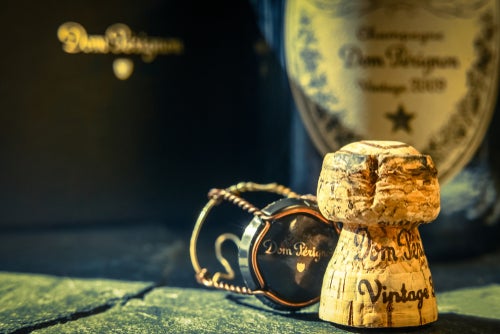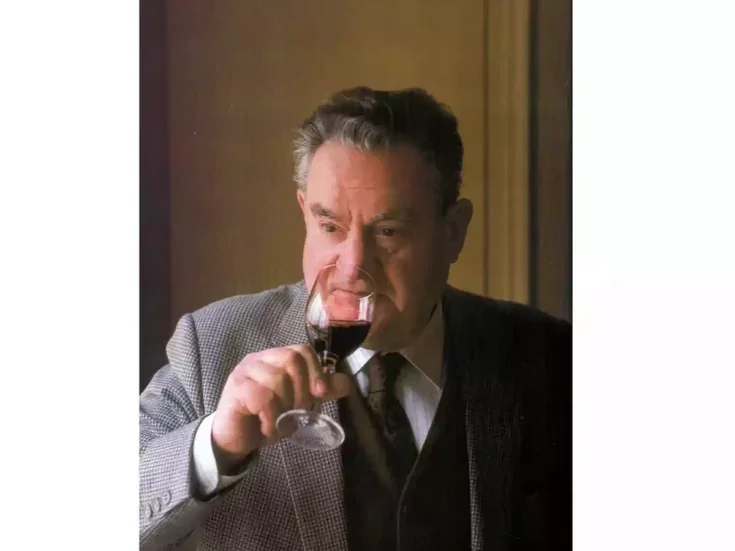
There’s a French proverb that warns, Il ne faut jamais dire, “Fontaine, je ne boirai jamais de ton eau.” Sara Lecompte Cuvelier did say just that, though, and probably more than once. “I will never drink at your fountain” summed up her youthful attitude to her family company, and she took herself off into a career that was far removed from wine. Yet here she is now, running Léoville Poyferré and the rest of them, keeping the family management going for another generation. Life has a way of bringing someone back to what they most tried to avoid.
Sara took over in 2018 from Didier Cuvelier, who is her cousin; she is the youngest daughter of Bertrand Cuvelier. She got the job because she applied for it. Admittedly, she’d been on the board of directors since 2011 and used to come to meetings every three months—but why? What had happened to draw her back to this particular fountain?
Bertrand, her father, was general manager of a wine-merchant company in Lille. “I was in rebellion against my family; I wanted to be free from the family company. I had a character of rebelling when I was young. I was supposed to work with my family, but I wanted to make my own choices.” First of all, she wanted to be a nurse specializing in children, but what interested her was social relationships, and at 18, after her baccalaureate, she changed direction and decided to work in HR. “I met my husband at 18; we met in Paris. I finished my studies, then we went to live in the Lyon region.” Her studies were economic and social administration and then a course at the Institut de Gestion Sociale in Paris. “I didn’t want to stay in the north of France. There was no specific problem with my parents, but I needed to feel free.”
We should break off here for a short tour of the Cuvelier family—forgive me if you know all this. Henri Cuvelier started as a wine merchant in 1804 near Lille, in northern France; the company was called H Cuvelier & Fils. One hundred or so years later, brothers Paul and Albert Cuvelier started buying châteaux: Le Crock in 1903, Camensac in 1912, and Léoville Poyferré and Moulin Riche in 1920. In 1946, Max Cuvelier started a second merchant business, in Bordeaux; this négociant business gave them roots in all aspects of Bordeaux.
Most recently they have branched out into Argentina; in 1998, Bertrand joined forces with Michel Rolland in Clos de Los Siete, and three years later his cousin Jean-Guy decided to take part as well, and they built a winery, now called Cuvelier Los Andes. (Everybody in this story is called Cuvelier unless stated otherwise.) Bertrand is now 81, “in very good health,” says Sara, “with a dynamic mind.” And there are some Cuveliers working in other fields: Guillaume has a business in New York, and Loïc works for BNP in Paris. They are also on the board. Sara’s sister Anne (because although Sara wanted to break away from her family, they are always there in the background, like a gentle murmur from a Greek chorus) went to Sacramento in the US for a year, then went to Brussels to study languages.
So, there is Sara, living near Lyon, with husband and, in time, young children, working in HR for big catering groups that had contracts with schools and hospitals and responsible for the Lille–Strasbourg–Dijon area of France. She was involved in recruitment, looking for people able to manage a team to cook meals and manage restaurants. “They were difficult to find even then,’” she says. “Now, after Covid, nobody wants to work.” French employment law is notorious, and there was a lot of that to deal with, to ensure compliance with working hours and disciplinary procedures, but also hiring and training, helping people progress and helping employers retain staff. “It was difficult to keep people even then. The object was to motivate people, and not just with money. I liked that aspect the most. You could really talk about all human resources. Now I hear tales of HR, and there are so many things I disapprove of. Then it was about managing employees and keeping them motivated, helping them find the best job.
“There’s a big difference in HR management in small companies compared to big firms. There’s a lot of hypocrisy in HR—political aspects, like who obeys the general manager and does what he wants.” For her, she says, “it’s about listening to people, taking care of people. You have to fire people; you have to do things that are not positive. I’m a realistic person. But being HR and being a right arm with a gun, just carrying out the will of the general manager…” That, one infers, would not be to her liking. “I never had to do that.” She changed jobs a couple of times because she didn’t agree with company policy. “It was easy [to change jobs] when I was younger.”
From 2003, she was on the board of Château Le Crock and H Cuvelier, and in 2011 she joined the board of the St-Julien estates Léoville Poyferré and Moulin Riche. (The latter is mostly separate, though not entirely, from Léoville Poyferré.) The family Greek chorus was clearly getting louder, her rebellious streak perhaps fading a little. “I realized one day that wine was part of my legacy,” she says. “I was the only person in my family not working in wine, and I saw that when my father retired, it might become part of my role. I was frightened of knowing nothing of wine.” And then in 2014 Didier announced that he wanted to retire the next year. “Nobody in the family wanted or was able to take over,” says Sara. Didier’s son was just 20 and studying technology. Didier’s younger brother Olivier was running the négociant business in Bordeaux, and his three children were all too young. So…
Education and transition
There were five directors: Didier, Bernard, Olivier, Loïc, and Guillaume. Yes, with Sara that makes six, but Sara was an apprentice director, with no voting rights. The two last wondered about recruiting outside the family and thus bringing in new ideas, but the others thought it better to have a family member in charge—“to keep the family mind in the managing of the estates,” says Sara. “Taking an outsider is a risk, and some people would leave; there might be too many changes. The majority of votes were for a family member, and I was the only one. Didier was happy to know that someone could take over so that he could retire.”
Sara was, of course, already on the board of directors and was involved in investment decisions, decisions on strategy, and tasting, and yes, she says, she had “general knowledge of the history of Bordeaux, the names of the growers and the wines, but no real knowledge of tasting. I used to drink the wines of my family from Bordeaux and from Argentina, but I had no real tasting abilities, and I knew nothing of agriculture.
“Didier used to talk to me for a long time; I was on the board, and he had the opportunity to know me and see my way of working and thinking. They all knew I wouldn’t bring about a revolution.”
What she had to do was go back to school. She signed up for a master’s in wine-estate management at Bordeaux Sciences Agro, followed by a diploma in wine tasting (“every Monday morning and Friday afternoon, with 50 students of 20 years and upward,” two and a half hours at a stretch, mostly French wines and mostly Bordeaux), and in 2017 she worked with Didier. On August 1, 2018, she took over properly, with Didier staying as consultant for the next year and a half. “He really wanted to stay for the 100th anniversary,” says Sara. “Little by little I took my autonomy. At the start, I was really happy he was coming one day a week, but I felt it became necessary for him to stop. I wanted to make decisions myself, and I started to feel I had other things to do and didn’t have time to talk to him. I had enough time to get all the information [I needed].” And she is decisive, is Sara. She listens, and she decides. “Sometimes I’m too quick at making decisions. It can be a problem: I need to take time and not go too fast.”
She took over 55 employees, and of course she already knew many of them; her sister Anne had also been working there since 2005, in charge of tourism and events. “They were soulagé,” she says—relieved to hear that Sara would be taking over. “They had been scared it would be an outsider, so I had a good welcome. I work differently from Didier: I’m more detailed in some things and less in others, and I have different interests.” He wasn’t so keen, perhaps, on the meetings that French law dictates must be held every two years between managers and employees to discuss their feelings and their needs. Sara instigated these—she with her seven managers, they with their teams: a cascade of meetings, by the sound of it. But as she points out, “I needed to understand everything. It wasn’t obvious to me as it was to Didier. He had grown up at the château, and he knew everybody so well.”
She wanted to get everybody involved in making decisions and for everybody to be aware of decisions and strategy. Getting people to contribute to decisions was, she says, “quite a change from Didier, but it’s my way of working.” In the last resort, employees don’t decide, but managers must listen. She gives the example of the vineyard manager. “He was working a bit on his own: only one manager for 80 hectares [200 acres] and no assistant. So, we recruited an assistant, and now there are two of them, and I can have the vineyard manager more in the office and the winery with the enologist and the cellar master, which means a new team of three working together. Before, the vineyard manager never had time to be in the office.” That also solves the traditional fight between vineyard and cellar, she points out.
All in all, it seems to have been an uneventful takeover. Nobody left in a huff; there was no blood on the floor. “We have a very small turnover of staff at Léoville Poyferré. People are very faithful. They work for the estate as if it were their estate, especially the managers. Because it’s a family estate, there’s a good atmosphere. I always felt that, long before I arrived. People smile.”

Keeping the personality of Léoville Poyferré
And the style of the wine? “My view of the wine style is the same as Didier’s. There has to be evolution because of climate change—you can see it: 2018, ’19, ’20, ’22 are very solar years, with very concentrated wine, opulent and with more alcohol. But Didier used to say, and I agree, that specific soils give freshness. I don’t want to change the style of the wine, and we have new technical tools that can improve the quality while keeping the style. If you do a vertical tasting, you see different styles because of the weather, but the tannic structure is always recognizable as Léoville Poyferré.
“The blend evolves a bit, if we replace a plot because it’s too old and the yield is too low, and if it’s Merlot, we’ll replace it with Cabernet Franc or Cabernet Sauvignon. The evolution of the blend is toward less Merlot. It is distinctive compared to the other Léovilles and the other super-seconds, which have a higher proportion.”
Keeping that established personality is key, of course. Sara talks of the blend of the 2016, for which she was there in 2017. There were 55 samples on the table and different options. One of these options was exceptional, but it wasn’t Léoville Poyferré anymore, and it reminded them of the neighbors. So, they went for the second option, which was very Léoville Poyferré.
Her objective for the wine is more and more precision, with improvements every year to facilitate this. “We’ve invested in smaller vats; we replace about 2 percent of the vineyard each year—dead vines—with young vines spread across the old plots. The young vines ripen earlier, so we pick just the young vines and vinify them separately. They taste totally different; you realize the effect of age on vines. We also vinify the ends of the rows separately. They ripen later, so we pick them later. We use them for kosher wine, because we want an exact representation of the vineyard for kosher wine, with the same quality.”
It’s certainly extra trouble to make kosher wine, because the technical team can’t touch anything. But “it’s a way to be known. Many people who buy kosher wine for Jewish feasts don’t always buy kosher wine.”
As you might suppose, she no longer lives near Lyon. They’ve moved to the village of Bruges (the one near Bordeaux, not the one in Belgium), and her husband works in Pessac, helping companies invest in new technology; the traffic jams on the rocade have made him buy a motorbike. Sara likes it there (Bruges, not the rocade): “It’s 45 minutes from the Médoc and an hour from the ocean. I’m in love with the ocean. As soon as I can at weekends, I go there, but my husband doesn’t. I don’t go to sit on the beach: I go walking, 5 kilometers [3 miles], I take a rucksack, no shoes, on my own. My husband loves boats, but I’m a bit scared on a boat.” She ran the Médoc marathon in 2018 and 2019, “but then I said stop, it’s too much. The first one was okay, and I thought the second would be easy and I didn’t train enough. So, I said never again.”
None of this story has so far touched on the inevitable question: How on earth does a woman with a husband and children uproot them all to run her family company? Even these days, it’s easier for a man to do that.
“I was 32 when I had my first child, 34 when I had the second. I stopped work for five years. My husband was in Geneva, and we were living in Annecy, and I stopped working to follow him. My biggest fear was what I would do when the children left home. I would be 50, not so young and not so beautiful, and with no job. It was a big fear for me. I said to my daughter, ‘I am sure I will never get bored before retirement.’
“It would perhaps be better for the château if I were younger—I’m 54 now—and if I could be there for 40 years,
like Didier. But I still have 15 years of work ahead of me.”
And luckily, her husband was also ready for a change. The children had friends locally, but “otherwise it wasn’t complicated to move.” (And now, she says of her inevitably long hours, “the children are big enough not to mind if I’m there or not.”) “Bordeaux feels safer than Lyon. My daughter Natasha was 12 or 13 when we left, and I didn’t let her take the bus on her own because there were unsafe places. But Bordeaux is totally different.” And she took her husband to New York in 2020, “and he was very happy. It was a way to get a pardon and say sorry.”
There is perhaps one thing missing. The 100th anniversary of the Cuveliers buying Léoville Poyferré was in 2020, and if they wanted to mark it with a small project, perhaps one could suggest… a fountain?






